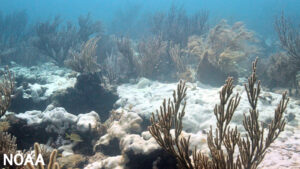When I was growing up during the Cold War, living with the specter of nuclear conflict, science fiction horror movies were a form of escapism from real-life dangers. “Invasion of the Body Snatchers” and “The Day the Earth Stood Still” were my favorite, while Godzilla provided the scariest moments on screen.
In a 1965 piece entitled “The Imagination of Disaster,” writer Susan Sontag argued that such flicks made real dangers seem mundane, ”inculcating a strange apathy concerning the processes of radiation, contamination and destruction.”
A look at today’s world evokes the Armageddon worries we used to occasionally hear from Ronald Reagan. Forests and fields are burning from China to British Columbia to Greece. Seawater temperatures off the Florida Keys have climbed above one hundred degrees Fahrenheit — the hottest ever measured. Glaciers are melting and floods have struck such once-serene places as Vermont.
The “absolutely overwhelming” evidence of global warming is everywhere.

“European and North American temperatures would have been virtually impossible without the effects of climate change. In China, it was more than 50 times more likely to happen compared to the past,” Izidine Pinto of the Royal Netherlands Meteorological Institute said Wednesday, reporting on results of a global weather study.
How can this be ignored, e.g. by Rupert Murdoch’s FNC, or denied even by likes of Donald Trump? The answer is the “Ostrich Effect.” Its name is taken from the long-necked bird renowned for allegedly putting its head in the sand to escape danger. The danger disappears, at least in eyes of the ostrich. (Actually, ostriches flop to the ground and lie still when they cannot escape.)
Ostrich tactics will neither stop nor slow climate damage.
No reassurances from Cliff Mass will bring back the melted Anderson and Lillian Glacier in the Olympics. Nor will bring a winter snowball onto the Senate floor keep D.C.’s heat index from climbing about 100 degrees Fahrenheit in summer.
But the Ostrich Effect is having wide application across a wide spectrum of social, political and environmental issues. If you are white and do not like being told of the history of slavery and white racism, particularly if you are the governor of Florida, you ban teaching it in schools and universities.
If you find people who identify as LBTQ+ unsettling, you remove books from the library that discuss them. You ban drag shows that make you feel threatened. If a pandemic threatens to hit, you claim the protection of “natural immunity.”
If you do not like being reminded of gun violence, as the country averages more than one multiple shooting each day, you outlaw the tracking of gun injuries and deaths by agencies that monitor public health.
Of course, too, if you lose an election, go into denial and say it was stolen. Claim, as do Trump and Kari Lake, that “everyone knows” that you won. So what if the facts are not with the Ostrich Effect, because that is the beauty of it. Facts don’t matter. It solves every problem — at least for you and your fellow deniers.
In her essay, Sontag described escapism of the Cold War era with the words: “We live under continual threat of two equally fearful, but seemingly opposed, destinies: Unremitting banality and inconceivable terror.”
Science fiction was deployed “to lift us out of the unbearable humdrum… into dangerous (fictional) situations which have last minute happy endings.”
The “Ostrich Effect” is not making for happy endings in today’s world. Instead, it is fueling a battle for the nation’s soul – to use Joe Biden’s phrase – between those who face reality and others who conjure up “alternative facts.”
The latter see a world of demons that includes climate scientists, anyone they consider their political opposition, and much of the medical profession.
Climate damage will not bring about the end of the Earth or the termination of life on earth. Our world will still be here. The globe will keep spinning. But humanity’s addiction to fossil fuels may make much of it unrecognizable and uninhabitable, especially for the generations to come that we’re borrowing this planet from.

